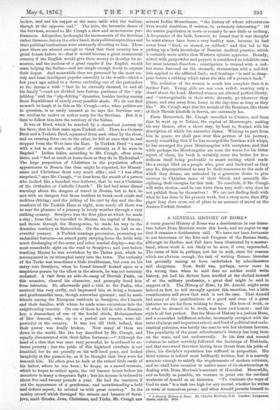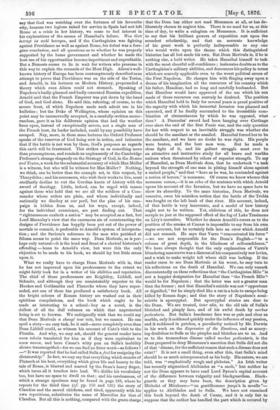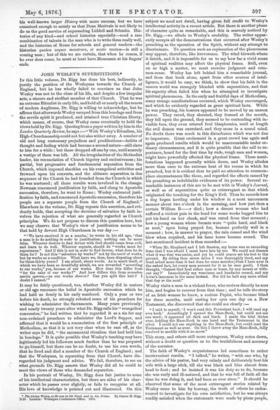A GENERAL HISTORY OF ROME.*
A GOOD general History of Rome was a desideratum in our litera- ture before Dean Merivale wrote this book, and we regret to say that it remains a desideratum still. We have not been fortunate- in our historians of the Rise and Progress of the Roman State, although its Decline and Fall have been illustrated by a master- hand, whose work is not likely to be soon, if ever, superseded. The cause of this is, perhaps, not far to seek, since for reasons which are obvious enough, the task of writing Roman histories. has generally among us been undertaken by schoolmasters. and clergymen. Now, Swift was, perhaps, never more in• the wrong than when he said that no soldier could write- history, yet had his dictum been levelled at the clerical instead, of at the military profession, a great deal might be said in support of it. The History of Rome, by Dr. Arnold, might seem indeed at first to tell strongly against this assertion, but a little consideration will show that such is not the case. That Arnold had many of the qualifications of a good and even of a great historian we are far from wishing to deny. His love of truth, or- of what he deemed to be truth, was keen and honest ; and his• style is all but perfect. But the Muse of History is a jealous Muse, and a somewhat indifferent scholar, incessantly occupied with the cares of alarge and important school, and fond of political and eccle- siastical polemics, was hardly the man to win her choicest favours.. The popularity of the great schoolmaster's history has long been on the wane, and not undeservedly. In his first and second. volumes he rather servilely followed the footsteps of Niehbuhr, and that renowned theoriser having been thrust from his pride of place, his disciple's reputation has suffered in proportion. His- third volume is indeed most brilliantly written, but it is scarcely accurate enough to satisfy the requirements of modern criticism, and we shall have occasion to notice some of its shortcomings in dealing with Dean Merivale's account of liannibaL Meanwhile, and as briefly as possible, we venture to point out the cardinal weakness of Arnold as an historian. "To vindicate the ways of God to man" is a task too high for any mortal, whether he writes in verse or numerous prose ; and when Arnold permits himself to • A General History of Home. By Charles iterivale, D.D. London: Longman, Green, and 00. 1875. say that God was watching over the fortunes of his favourite city, because two legions raised for service in Spain had not left Rome at a crisis in her history, we cease to feel interest in his explanations of the causes of Hannibal's failure. Wen Gott hietritgt ist wohl betrogen, and if the Carthaginian was fighting against Providence as well as against Rome, his defeat was a fore- gone conclusion, and all questions as to whether he was properly supported by the home government and whether he made the best use of his opportunities become impertinent and unprofitable. But a Nemesis seems to lie in wait for writers who presume in 'this way to explain the counsels of the Most High. Alison's well- known history of Europe has been contemptuously described assn attempt to prove that Providence was on the side of the Tories, and Arnold, in his lectures on Modern History, propounded a theory which even Alison could not stomach. Speaking of Napoleon's badly-planned and badly-executed Russian expedition, Arnold said that the French Emperor was put down by the hand of God, and God alone. He said this, referring; of course, to the severe frost, of which Napoleon made such adroit use in his bulletins ; but the Duke of Wellington, whose opinion on this point may be unreservedly accepted, in a carefully-written memo- randum, gave it as his deliberate opinion that had the weather been open, instead of exceptionally severe, not a single man of the French host, its leader included, could by any possibility have escaped. Nay, more, in these same lectures the Oxford Professor speaks of the reserves of God being now in action, and intimates that if the battle is not won by them, God's purposes as regards this earth will be frustrated. This strikes us as something more than presumptuous, and reminds us unpleasantly of the Cambridge Professor's strange rhapsody on the Strategy of God, in the Roman and Teuton, a work for the substantial accuracy of which Max Muller is a witness, but who will be witness for Max Muller? Nothing, we think, can be better than the example set, in this respect, by Thucydides ; and his successors, who wish their works to live, must .stedfastly decline to cut the Gordian knots of history with the .sword of theology. Little, indeed, can be urged with reason .against those who hold that we are all the soldiers of a Com- mander whose orders are plain, and whom individually and .nationally we disobey at our peril, but the plan of his cam- paign is hidden from us, and his ways, except, indeed, for the individual conscience, are past finding out. That "righteousness exalteth a nation" may be accepted as a fact, but Lord Macaulay's view that the enormous sin of counteracting the designs of Providence has happily been put out of the power of mortals to commit, is preferable to Arnold's system of interpreta- tion ; and the Saviour's reference to the men who perished at Siloam seems to point the same way. Dean Merivale, as is per- haps only natural—it is the head and front of a clerical historian's offending—leans to Arnold's view, but were this the only abjection to be made to his book, we should lay but little stress upon it.
What we really have to charge Dean Merivale with is, that he has not improved upon his predecessors to the extent we might fairly look for in a writer of his abilities and reputation. The chief of those predecessors are Keightley, Liddell, and Schmitz, and although they are unmistakably superior to the Hookes and Goldsmiths and Pinnocks whom they have super- seded, not one of them has produced a satisfactory book. All the bright colours of Roman history are washed out in their spiritless compilations, and the book which ought to be made as interesting to a school - boy as a novel, is the dullest of all the dull volumes on which that unprotected being is set to browse. We unfeignedly wish that we could say that Dean Merivale a changi tout tela, but we cannot. He can spoil a story—no easy task, be it said—more completely even than Dean Liddell could, as witness his account of Cato's visit to the Corolla. And why, we may ask, should the general reader have nova tubules translated for him as if they were equivalent to nova menses, and have Caesar's witty pun on Sulla's inability dictare transmogrified—for we can find no fitter word—as follows ? —4‘ It was reported that he had called Sulla a fool for resigning the dictatorship." In fact, we may say that everything which smacks of Plutarch at his best, everything which gives life and beauty to the tale of Rome, is blurred and marred by the Dean's heavy finger, which turns all it touches into lead. We dislike his vocabulary 'too, but have no space to dwell on that ; and his carelessness, of which a strange specimen may be found in page 188, where he repeats for the third time (cf. pp. 110 and 125) the story of Claudius and the sacred chickens, and tired, apparently with his own repetitions, substitutes the name of Marcellus for that of Claudius. But all this is nothing, compared with the grave charge that the Dean has either not read Mommsen at all, or has de- liberately chosen to neglect him. There is no need for us, at this time of day, to write a eulogium on Mommsen. It is sufficient to say that his brilliant powers of exposition rest upon the soundest scholarship, and that an accurate knowledge of his great work is perfectly indispensable to any one who would write upon the theme which this distinguished historian has all but made his own. But Dean Merivale is, if he is nothing else, a bold writer. He takes Hannibal himself to task with the most cheerful self-confidence ; insinuates doubts as to the Carthaginian's military abilities, and denounces his policy in terms which are scarcely applicable even to the worst political errors of the First Napoleon. He charges him with flinging away upon a dream of his imagination all the resources of his country which his father, Hamilcar, had so long and carefully husbanded. But that Hamilcar would have approved of the use which his son made of those resources can scarcely be doubted. The position which Hannibal held in Italy for several years is proof positive of the sagacity with which his immortal Invasion was planned and executed, and if he finally succumbed to the irresistible com- bination of circumstances by which he was opposed, what then? A Damocles' sword had been hanging over Carthage ever since the end of the first Punic war, and the only question for her with respect to an inevitable struggle was whether she should be the assailant or the assailed. Hannibal forced her to be the assailant, and we have no doubt he was right. His people were beaten, and the best men won. But he made a close fight of it, and his gallant struggle must ever be an attractive and instructive study for all brave and warlike nations when threatened by others of superior strength. To say of Hannibal, as Dean Merivale does, that he undertook " a task beyond the strength of one man in pitting himself alone against a united people," and that " hero as he was, he contended against a nation of heroes," is nonsense. Of course we know whence this nonsense comes,—it is an echo of the sentence with which Arnold opens his account of the Invasion, but we have no space here to show its absurdity. To the same historian, Dean Merivale, we conceive, owes his mistaken notion that the battle of the Trebia was fought on the left bank of that river. His account, indeed, of that battle is very inaccurate, and a model of how history ought not to be written. Yet, oblivious of this, he does not scruple to jeer at the supposed effect of the fog of Lake Trasimeno on Livy's narrative. Whether he shares Arnold's errors as to the position of the armies at Canna; is impossible to say from his own vague account, but he certainly falls into an error which Arnold did not commit. He says that Varro "concentrated his force" —we are not responsible for the Dean's English—" to a column of great depth, in the blindness of self-confidence." We have always thought that the only explanation of Varro's blundering manoeuvre was a distrust of his comparatively raw levies, and a wish to make weight tell where skill was lacking. If the reader cares to see Dean Merivale at his worst, he may turn to his reflections on the death of Hannibal. We can only remark discontentedly on these reflections that "the Carthaginian Milo "is not a happier designation for Hannibal than "the French Milo" would be for Napoleon ; that the latter was not a greater man than the former ; and that Hannibal's suicide was not " opportune or dignified," for he simply died like a rat in a hole to escape being killed by Roman dogs ; and that the story of Napoleon's semi- suicide is apocryphal. But apocryphal stories are dear to the Dean. We are treated, inter alia, to the old tale of Sulla's blotched and pimply face, and of his awful death by morbus pedicularis. But Sulla's handsome face was as pale and clear as marble, only it reddened quickly under the influence of any passion, and it reddened in patches, a peculiarity noticed by Mr. Darwin in his work on the Expression of the Emotions, and as annoy- ing doubtless to Sulla as the pimples and blotches are to us. And as to the tremendous disease called morbus pedicularis, is the Dean prepared to deny Mommsen's assertion that Sulla did not die of that 'disease, for the sufficient reason that such a disease does not exist?' It is not a small thing, even after this, that Sulla's mind should be as much misrepresented as his body. His nature, we are told, was " emphatically rough and plebeian." An Irish writer has recently stigmatised Alcibiades as "a snob," but neither he nor the Dean appears to have read Lord Byron's capital account of the difference between vulgarity and blackgaardism. Black- guards as they may have been, the description given by Michelet of Mirabeau— " un gentilhomme jusqu'k la moelle "— applies to Alcibiades and to Sulla. We have not examined this book beyond the death of Caesar, and it is only fair to suppose that the author has handled the part which is covered by his well-known larger History with more success, but we have examined enough to satisfy us that Dean Merivale is not likely to do us the good service of superseding Liddell and Schmitz. His- tories of any kind—and school histories especially—need a rare combination of talents in the man who is to write them really well, and the historian of Rome for schools and general readers—the historian qualem nequeo monstrare, et sentio tantum—is still a coming man ; but of this we are certain, that when he comes, if he ever does come, he must at least have Mommsen at his fingers' ends.




































 Previous page
Previous page